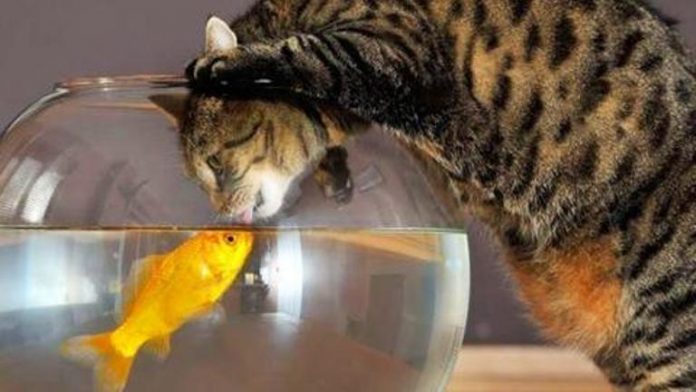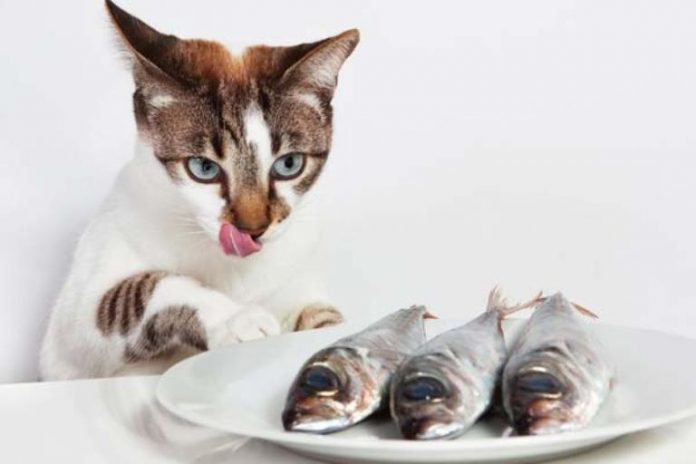Members of the feline population love eating fish but seem to be averse to getting into the water. This raises questions on how they were able to satisfy their cravings for fish prior to domestication – why do cats like fish? However, it has been established that not all cats hate water as we have seen quite a good number of breeds that love being in the water. For one, the Turkish Van cat was dubbed “the swimming cat” because of its love for water; the cat just loves to swim and won’t hesitate one bit to join its parent in the shower.
There are other breeds like the Maine Coon, the Abyssinian, and the Bengal that are not averse to water, even some extant feral cats like Prionailurus planiceps, otherwise known as the flat-headed cat, and the fishing cat or Prionailurus viverrinus, are known as experienced fishers.
Offering your feline friend fish from time to time can be quite nice since it is animal protein and cats are known to be obligate carnivores. However, we need to take so many things into consideration before deciding to go on a fish diet for our furry friends. First, cat parents should rule out fish allergy, if your cat is allergic to fish, it may not be a good idea to feed fish to it. Besides, the nutritional content of fish goes a long way in determining how good or bad a fish meal will be to the digestive tract of your cat. Continue reading to get the full details.
Table of Contents
Do Cats Like Fish?

Going by historical accounts, the first human beings that domesticated felines were from Egypt. These ancient Egyptians used fish as a lure to get the cats into their homes, since then, there have been speculations that the felines developed the craving for fish from that era. After all, cats are descendants of desert animals and are known to be averse to water, thus, the chances that they went hunting for their own fish is nil.
Another tale said that cats developed their taste for fish while hanging around docks, watching fishermen clean their daily catch after which they toss the offal. These cats never went diving for their fish meals. Basically, domestic cats are considered to be opportunistic feeders, willing to try out whatever comes their way, at least once. In addition, they have spent thousands of years hanging around people, scavenging the leftovers that come from humans; this includes fish.
Apart from the aforementioned, the odor that emanates from fish is quite strong and distinctive, so, it will be only reasonable for one to conclude that the odor is attractive to the felines, and upon tasting it, they got hooked.
Again, during the Victorian era, fish was among the available cheapest protein sources which perhaps made them see it as the feline’s favored protein.
Some cats’ love for a fish meal is really strong. Families that have aquariums will often find their pet cat stalking the fish inside as they move within the glass enclosure.
Is It Safe To Feed Fish To Your Cat?
It is considered safe to feed your feline friend with fish but you should take note of the fact that some cats are allergic to fish. Yes, cats suffer from allergies like humans. The immune system of a cat that suffers from fish allergy will be overreacting to a protein present in the food, giving rise to skin problems, as well as digestive issues. You may notice such symptoms like:
• Vomiting
• Diarrhea
• swollen skin
• Loss of hair and scratching
• Wheezing
• Sneezing and coughing
Desist from feeding your cat with fish upon noticing these symptoms. Salmon and tuna may be part of the most popular choices because of their Omega-3 fatty acids content, however, they are known to be replete with mercury. In this case, your choice should run to smaller fish like cod, halibut, and flounder. These ones are known to contain less amount of mercury, making them a safer choice.
Though fish is rich in amino acids which is an essential part of a cat’s dietary needs, it does not have certain minerals such as calcium, iron, and sodium. Apart from its mercury content, fish is replete with phosphorus and also has a high level of iodine and several other ingredients that may cause harm to a cat if fed excessively and over a long period of time.
Also, there is the fact that fish doesn’t have all the essential vitamins and minerals for a balanced and healthy diet. Yes, its protein content is high but nutrients like vitamin E and vitamin B are absent. Apart from these, a fish’s nutritional content is highly dependent on its habitat. Some fish farmers leverage unhealthy sources of water that are mostly filled with impurities like pollutants and sewage.
Consequences Of Feeding Your Cat With The Wrong Type Of Fish
Though fish supply the body with protein, fatty acids, and taurine, harmful toxins such as mercury is present, thiaminase is also there. Thiaminase is an enzyme that destroys thiamine in the body and the feline population needs thiamine as its deficiency in a cat’s body may cause damage to its nervous system. However, it takes quite a long time for the deficiency to develop, a cat will have to be fed with fish for a very long time. Besides, feeding a cat with an excessive fish meal may expose your fur buddy to the risk of developing hyperthyroidism or urinary tract infections.
If you must feed your fur buddy with tinned fish, ensure it is not the type stored in oil. As for feeding a feline with raw fish meal, this is not advisable as it can lead to health problems. Your cat will also be exposed to parasites.
Cats shouldn’t be allowed to feed on smoked fish, fried fish, or the type that has been spiced with additives and cooked in oil. Also to be avoided are fish products like fish fingers or breaded fish. If you must feed a feline with fish, then it has to be kept as simple as possible. Boiling or grilling the fish is a good option or you can go for the type of fish preserved in water as opposed to oil.
What Type Of Fish Do Cats Like?
Generally, cats don’t seem to have any special liking for any particular fish, remember, they are opportunistic feeders and would love to taste whatever they are offered. Thus, any kind of fish would do, including:
- Salmon
- Tuna
- Cod
- Halibut
- Flounder and many more
It is now left for the pet parent to choose the one with nutrients that are suitable for a cat’s dietary requirement and will not cause any lasting harm.
Read Also: Do Cats Have Nightmares Like Humans?
Why Do Cats Like Fish?
The African wildcat is arguably the ancestor of the present-day domesticated cat and it never fed on fish at all. Their diet in the wild majorly consisted of mice, reptiles, rabbits, and rats.
Scientists are yet to come up with suggestions on how the felines acquired the tendency to eat fish since they are averse to water, however, speculations abound.
Although cats’ sense of taste is different from that of humans as it is not as distinct, their sense of smell is superior, and the strong odor that emanates from fish might be the attraction.
Cats being opportunistic feeders that love to have a taste of whatever comes their way must have gotten hooked on fish after having a taste.
In conclusion, fish tastes and smells different from a feline’s normal prey, perhaps it is the quest to taste something different
